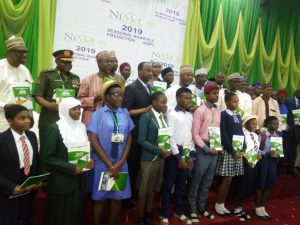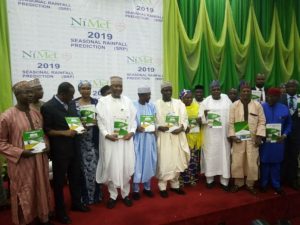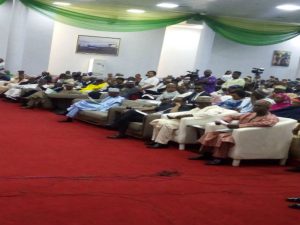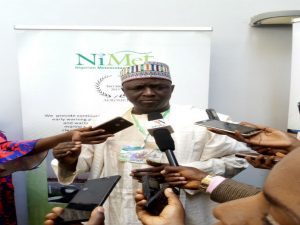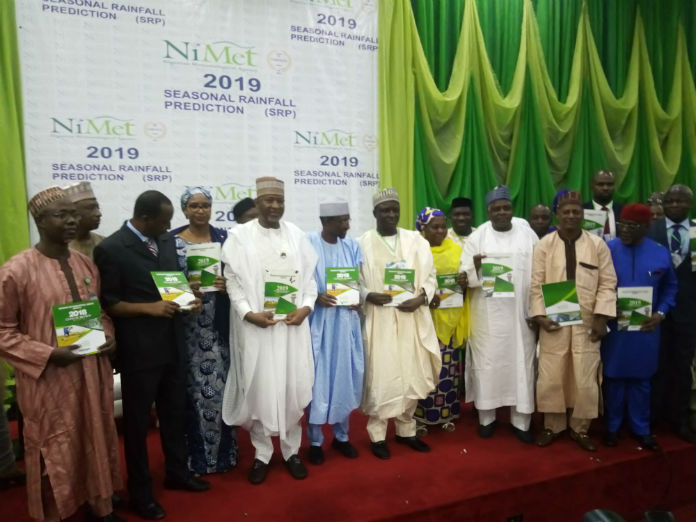The 2018 Seasonal Rainfall Prediction (SRP) review, carried by the Nigerian Meteorological Agency (NiMet), has been acclaimed to increase last year’s annual agricultural productivity yield by 50 percent in the all geographical zones of the country.
The Minister of State, Aviation, Senator Hadi Sirika disclosed this at the unveiling of the 2019 SRP in Abuja yesterday Thursday; “I have reliably confirmed that, the SRP provides useful information for reducing losses, and taking advantage of favourable weather conditions to increase productivity. Several testimonies from farmers who have used the SRP across the states such as Katsina, Sokoto, Kebbi, Oyo, Enugu and Jigawa confirmed the reliability of this tool in boosting agricultural productivity by an average of 50% increase in annual yield” he said.
The Minister expressed delight in the achievement recorded by NiMet in recent times; “The Agency has made series of efforts to consistently improve on the lead-time, quality and accuracy of this very vital product. Over the past years, SRP has gained national and international recognition, especially in water resources and agricultural sectors due to recorded impact by practitioners, such as improvement of the sector’s contribution to national GDP”, Sirika noted.
He also noted that the weather and climate information being produced by NiMet is therefore critical for combating Climate Change through adaptation and mitigation strategies; “It is against the foregoing challenging background, that, Nigerian Meteorological Agency (NiMet) embarks on regular weather and climate predictions to help the public mitigate the effects of extreme weather events” he stated.
On Agriculture and Food security, the Minister highlighted the close link to weather and climate conditions stating adverse weather and climate conditions directly affect agricultural productivity, livelihoods, water security, land use, agricultural marketing systems, food prices, trade and economic policies and small holder farmers, livestock herders and forest dependent communities are often highly vulnerable to these impacts.
Senator Sirika said that considerable efforts have been made in the past to down-scale the forecast to states and local government levels for wider usage and enhanced productivity as the prediction was downscaled to cover all the 774 local governments across the length and breadth of the country. The first time in history that the Agency has achieved this remarkable feat.
“According to World Bank, for every dollar invested in early warnings services on weather, about $7 is saved from cost of disaster management. For more effective service delivery, NiMet has continued to acquire modern weather observing, monitoring and forecasting infrastructures. Studies have shown that despite the increasing number of disasters, with innovative advancement in such EWS facilities, the number of casualties can be significantly reduced by 10%, he further explained.
The Director General/ CEO NiMet, Prof. Sani Abubakar Mashi who gave detailed explanation of the 2019 Rainfall Prediction and the 2018 Climate Review, reiterated that the forecast indicates that the country is expected to experience below normal- to- normal rainfall season.
He said that, “The rains are expected to start late especially in the northern parts of the country while the south-eastern zone as well as the Coastal areas will experience normal onset of the rains. While most of the Northern States will experience earlier than normal end growing season. Shorter length of the growing season is predicted for most parts of the country.”
Professor Marshi cautioned that, dry spells during the rainy season will be more frequent and severe for about 10-18 days, between June and July in some parts of the extreme North, while the ‘Little Dry Season’ (August break), will be pronounced in some parts of the South”. He advised farmers in that may be affected in those areas to take precaution.
The 2019 Seasonal Rainfall Prediction (SRP) and the 2018 Climate Review which has the theme: ‘Weather –ready, Climate –Smart Economy’ will surely leads to sustainable national development.
The annual Seasonal Rainfall Prediction is part of the Agency’s Meteorological Early Warning System (EWSs), containing rainfall and temperature outlook for the year, climate and health forecast as well as the possible socio-economic implications of the projected weather patterns. It is designed to provide relevant information for planning and execution of projects and programs in various sectors of the economy, especially those that are sensitive to weather. Agriculture, air transportation, infrastructure construction, telecommunication, water resources are particularly sensitive to weather variability. The SRP is further updated regularly by the Agency to give more focused weather pattern during the season.
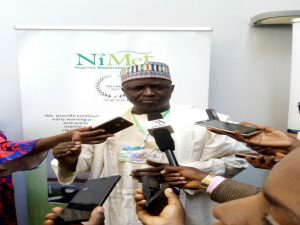
Testimonies of some farmers were also read out with excitement.
The 2019 SRP was attended by organisations and groups from different sectors of the economy. There were goodwill messages from organizations and technical section. Among attendees were the FCT Minister, Senate Committee on Aviation, House Committee on Aviation, ECOWAS, the Military, Permanent Secretaries,Federal Ministry of Environment, Federal Ministry of Transportation and the Federal Ministry of Water Resources.
Others present were, the Nigerian Meteorological Society, Association of Nigerian Geographers, British American Tobacco Nigeria Foundation, Nigeria Hydrological Agency, World Meteorological Organisation, Katsina State Government, National Emergency Management Agency, Aviation professionals, Environment and Agricultural experts.
